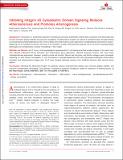Inhibiting Integrin α5 Cytoplasmic Domain Signaling Reduces Atherosclerosis and Promotes Arteriogenesis
Author(s)
Budatha, Madhusudhan; Zhang, Jiasheng; Zhuang, Zhen W.; Yun, Sanguk; Dahlman, James E.; Schwartz, Martin A.; Anderson, Daniel Griffith; ... Show more Show less
Downloade007501.full.pdf (3.901Mb)
PUBLISHER_CC
Publisher with Creative Commons License
Creative Commons Attribution
Terms of use
Metadata
Show full item recordAbstract
Background--Fibronectin in endothelial basement membranes promotes endothelial inflammatory activation and atherosclerosis but also promotes plaque stability and vascular remodeling. The fibronectin receptor α5 subunit is proinflammatory through binding to and activating phosphodiesterase 4D5, which inhibits anti-inflammatory cyclic adenosine monophosphate and protein kinase A. Replacing the α5 cytoplasmic domain with that of a2 resulted in smaller atherosclerotic plaques. Here, we further assessed plaque phenotype and compensatory vascular remodeling in this model. Methods and Results--α5/2 mice in the hyperlipidemic apolipoprotein E null background had smaller plaques in the aortic root, with reduced endothelial NF-κB activation and inflammatory gene expression, reduced leukocyte content, and much lower metalloproteinase expression. However, smooth muscle cell content, fibrous cap thickness, and fibrillar collagen were unchanged, indicating no shift toward vulnerability. In vivo knockdown of phosphodiesterase 4D5 also decreased endothelial inflammatory activation and atherosclerotic plaque size. α5/2 mice showed improved recovery from hindlimb ischemia after femoral artery ligation. Conclusions--Blocking the fibronectin-Integrin α5 pathway reduces atherosclerotic plaque size, maintains plaque stability, and improves compensatory remodeling. This pathway is therefore a potential therapeutic target for treatment of atherosclerosis. Keywords: arteriogenesis; atherosclerosis; fibronectin; inflammation; matrix metalloprotease; phosphodiesterase 4D5; plaque vulnerability
Date issued
2018-01Department
Massachusetts Institute of Technology. Institute for Medical Engineering & Science; Harvard University--MIT Division of Health Sciences and Technology; Massachusetts Institute of Technology. Department of Chemical Engineering; Koch Institute for Integrative Cancer Research at MITJournal
Journal of the American Heart Association
Publisher
American Heart Association
Citation
Budatha, Madhusudhan et al. “Inhibiting Integrin Α5 Cytoplasmic Domain Signaling Reduces Atherosclerosis and Promotes Arteriogenesis.” Journal of the American Heart Association 7, 3 (January 2018): e007501 © 2018 The Authors
Version: Final published version
ISSN
2047-9980